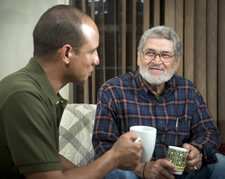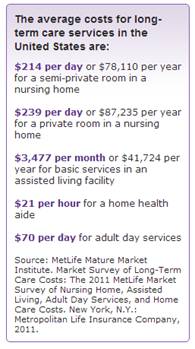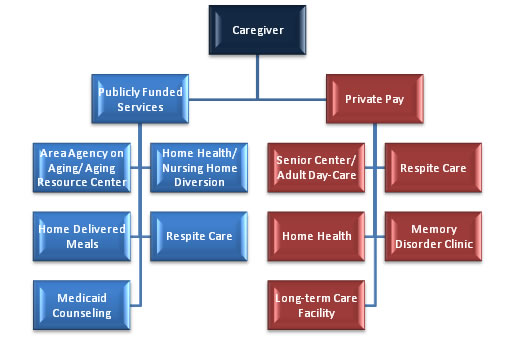Finding Outside Assistance and Resources


Finding people, programs, and services than can help the caregiver care for their loved one with dementia, and for themselves, can be beneficial. Learn about caregiver resources and assistance that are available in this section.
Before reading the content on this page, it may be beneficial to review the following video(s) from the Office of Rural Health (ORH).
Finding Caregiver Assistance
Length: 05:58
Given his worsening condition and agitation, Margaret can no longer care for Harold alone. She has to decide what to do next.
Resources for Caregivers
Length: 04:30
Nurse explains in detail the resources caregivers can use to find the help they need.
Why Do You Need Assistance?
Illnesses, emergencies, and your need for breaks can mean that you and your loved one need to adjust to having others help with caregiving. It is better to make this adjustment before any crisis occurs. 
There are times when you cannot do everything alone. Perhaps your situation has changed and you are no longer able to care for your loved on your own. Sometimes you just need a break to take care of yourself and your health. You can find resources and assistance within your community by searching the Eldercare Locator for what you need, such as adult day cares, financial assistance, etc. Y(ou can search by zip code or city and state.)
Accepting help from people, programs, and services is not a sign of failure as a caregiver. In fact, getting this help can make you a better caregiver. Home-health agencies can provide help for things that your loved one cannot do on his/her own. Consult with a social worker to make sure you understand what home health services you are eligible to receive, and whether the VA, Medicare, Medicaid, or private insurance covers the service.
Who Can Help?
Family, Friends and Volunteers 
Family members, neighbors, and community volunteers can provide social support for your loved one, and can also assist you in providing care. Having these people come into your home allows you and your loved one to adjust to having other caregivers. Scheduling regular visits lets you and your loved one plan ahead for this time. Be clear about your expectations if someone offers to help; this will help to avoid hurt feelings.
Immediate family should be encouraged to have a role in caregiving. It is important for everyone to help out. A family member could provide you with an afternoon break or help you with the grocery shopping and errands.
Community and Senior Centers
Community and senior centers offer daytime activities, sometimes providing meals and transportation. Some adult day care centers are designed specifically to provide activities for individuals with dementia.
Hired Assistance
Sometimes it is a good idea to hire someone to provide help for you and your loved one if you are able to afford it. It is critical that you interview potential helpers and check references before you make this decision. Consider having a family member or friend with you during the interview. See how they interact with your loved one and if you feel comfortable allowing them care for him or her. Sometimes you may need to try a few individuals before you find the right match for you and your loved one.
Publicly Funded Services
There are some publicly funded services offered by agencies such as Area Agencies on Aging that are dedicated to advocate, plan, coordinate, develop, and deliver services to seniors. More information on these agencies can be found in the resources section of this website.
Respite Care
Respite care is short-term help that is provided by someone else to give you a break from caring for your loved one. Respite care can be formal or informal and can occur in or out of your home. Some forms of respite care include adult day health care centers, home health services, or short-term admissions to community facilities.
Facilities that offer overnight or more prolonged respite services can be used if you need a longer break, want to travel, or need to be away from your home. Before using an outside facility, you will want to visit and tour the facility so that you feel comfortable with the arrangements for your loved one. It is always recommended that you learn about facilities in your area should your loved one ever need to be admitted to a respite program.
Veterans with dementia may be eligible to receive respite services that the VA can help to arrange. Ask your social worker if you would like to learn more.
Cost of Outside Services
Outside services for your loved one can be expensive but there are multiple ways to get assistance in paying for these necessary services. The following is from the Alzheimer’s Association regarding average costs of services.

The chart below shows some commonly used funding sources:

Additional Resources 
VA Resources 
US Department of Veterans Affairs
VA values your commitment as a partner in our pledge to care for those who have "borne the battle." We have several support and service options designed with you in mind. The programs are available both in and out of your home to help you care for yourself and the Veteran you love.
- Caregiver Support Network
- VA Caregiver Support Line: 1-855-260-3274
Geriatrics and Extended Care Services (GEC) is committed to optimizing the health and well-being of Veterans with multiple chronic conditions, life-limiting illness, frailty or disability associated with chronic disease, agining or injury. This VA site reviews information on delirium, dementia and Alzheimer's care, decision making, home and community based services, and advance care planning, among many other important topics that may be important for you as a caregiver.
Veteran's Crisis Line Phone: 1-800-273-8255 (Veterans Press 1)
The VA does not endorse the following resources or guarantee that their information is 100% accurate. However, you may be able to find some helpful information by visiting the following pages:
AlzOnline: Caregiver Support Online
Tips on how to begin finding help with your caregiving responsibilities.
Eldercare Locator
Find help in your community.
National Association of Area Agencies on Aging
Find caregiver resources available to you in your community.
References: Information adapted from Alzheimer’s Association and Office of Rural Health
If you have any questions or concerns, contact Dementia Caregiver Web Support.



















